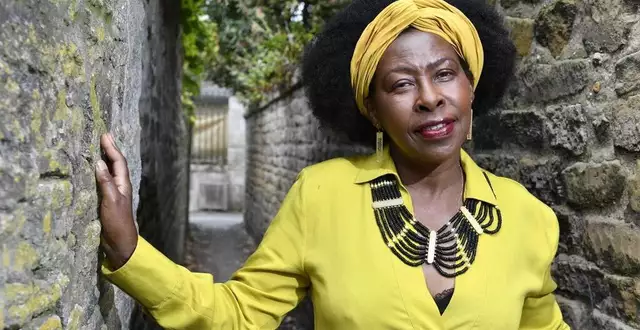Sister Deborah, the new novel by Scholastique Mukasonga, draws on the culture of her country and the syncretism born from the encounter between Christianity and traditional beliefs
Rwanda, 1930s. Colonial power over the small African country passed from the Germans to the Belgians, who dominate neighboring Congo. Having driven out the Protestant missionaries, it is now the white, Catholic Fathers who spread the Gospel. As much as the population showed itself willing to welcome the religion brought by the Europeans, the missionaries had to deal with the local culture and strongly rooted beliefs. This is the scenario in which the story told in the novel takes place Sister Deborah, just published in Italian by Utopia (pp. 136, euro 18).
The author, Scholastic Mukasonga, was born 66 years ago in Rwanda. Having transplanted to France a couple of years before the genocide, she is a significant voice of the Rwandan diaspora. Her books helped European readers learn about the horrors of 1994, when in one hundred days approximately one million Rwandans, including Tutsis and moderate Hutus, lost their lives. The writer also has a particular interest in the culture of her country and how it managed to survive during the colonial period, despite European attempts to erase it. After Kibogo ascended to the skyin which the protagonist saves his land from drought and is taken up into heaven as Jesus Christ, Mukasonga’s latest novel, with a light yet powerful style, addresses the coexistence between local tradition and innovations imposed by the rulers, placing the women at the center of the narrative.
Sister Deborah opens with little Ikirezi, in delicate health, brought by her mother to a healer at the only mission run by black missionaries from America. Here a woman, Sister Deborah, lays her hands to heal women and children, like the miracle-working kings in the Middle Ages. With the support of a local leader hostile to the European fathers, the mission led by Reverend Markus grows day by day thanks to the presence of Deborah and a ritual made up of songs, dances and drums closer to the hearts of the Africans. The prophetess predicts that the Savior will come on a cloud, but she will be a woman, and a black one at that. She will free women from the obligation to work the fields, spreading the seeds of a new plant throughout Rwanda, which will satisfy everyone and eliminate fatigue.
Sister Deborah involuntarily lights the fire of discontent among Rwandan women, overworked and with children to look after, angry at the men who get drunk on beer and beat them. The presence of the prophetess triggers a women’s strike from their obligations, a bit like in the times of Sistratas by Aristophanes. Such rebellion cannot be tolerated, neither by their husbands nor by the colonial authorities. The violent repression makes Sister Deborah’s fate uncertain. Is she dead, or did she escape? As in a detective story, it will be up to Ikirezi, who has meanwhile grown up and become a university professor, to discover the truth.
We asked the Rwandan writer what inspired her to create this novel.
«Per Sister Deborah I was actually inspired by a real event – she says -. In 1927, on the shores of Lake Muhazi, in the center of Rwanda, a prophet announces that a woman named Ndanga will rise from the lake: she will distribute miraculous sorghum seeds that will save women from working in the fields and will chase away the settlers. Ndanga’s followers appeal to the chef and to the royal court to join them. Unheeded, the movement was repressed by the colonial troops. And like Ndanga, the black messiah announced by Sister Deborah will also bring a miraculous seed.”
Traditional religion recognized an important role for women, who can be divinities, prophetess…
«Sister Deborah seems, in the eyes of women, to perpetuate the traditional prophetesses and miracle workers possessed by the female spirit known as Nyabingi. Sister Deborah is assimilated to such healers because, among other things, she possesses the magic reed which is their hallmark and she has the power to heal the illnesses of women and children.”
How was the coexistence between Christianity brought by the colonizers and traditional religion in Rwanda?
«The deposition in 1931 of King Musinga, hostile to Christianity, and his replacement with one of his sons instead favorable to missionaries leads the chef locals to a massive conversion, followed by the entire peasant population. But traditional beliefs often exist under the guise of Christian devotions. Thus, for many scholars, the Virgin Mary has taken the place of Nyabingi and, as regards the evangelical confessions, the Holy Spirit who takes possession of the born again it is very similar to traditional spirits mandava».
Is there something of traditional religiosity that survives in Rwanda today in the new generations?
«Colonization, but above all the White Fathers, tried to eradicate ancient beliefs. After the genocide, to rebuild the country the Rwandans had to refer to common traditions that had long been banned and considered “pagan”. A national holiday has thus come back into vogue, theThe dealer, the sorghum festival that celebrated the unity of the country every year. And if my books are always awaited and well received by students in Rwanda, it is because they find, in numerous passages, their traditions so I put all my heart into writing them.”
And you can feel it. For the Italian reader, each novel by Scholastique Mukasonga is an open door to his homeland. Lovely prose and characters that are not easily forgotten, like Sister Deborah, are the hallmark of a talented writer.
